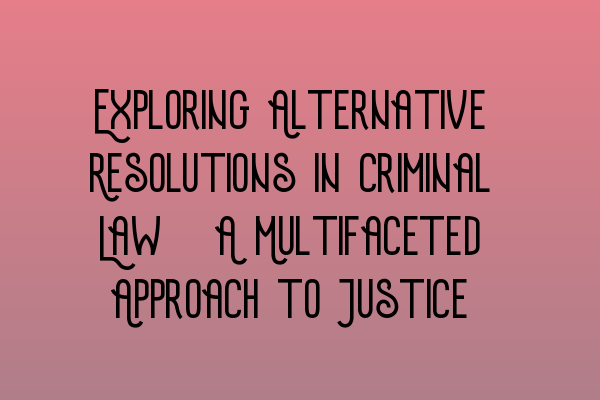Exploring Alternative Resolutions in Criminal Law: A Multifaceted Approach to Justice
When it comes to criminal law, the pursuit of justice is paramount. Traditionally, this pursuit has often revolved around the binary outcome of guilt or innocence. However, in recent years, the legal landscape has evolved, giving rise to alternative resolutions that prioritize rehabilitation, restoration, and education.
The SQE Criminal Law & Practice Law UK firmly believes that exploring these alternative resolutions is essential for a fair and effective criminal justice system. In this blog post, we will delve into the various approaches and their benefits, shedding light on how they can contribute to a more holistic approach to justice.
Restorative Justice
Restorative justice is an approach that focuses on repairing the harm caused by criminal behavior. Rather than emphasizing punishment, it prioritizes reconciliation between the offender, victim, and the community. This approach offers victims the opportunity to have their voices heard, seek answers and closure, while offenders have the chance to take responsibility for their actions and make amends.
By integrating restorative justice principles into the criminal justice system, we can foster empathy, promote healing, and reduce the likelihood of reoffending. It encourages individuals to understand the impact of their actions and actively participate in their own rehabilitation process.
For more information on restorative justice practices, you can refer to our related article: SQE 1 Practice Exam Questions.
Diversion Programs
Diversion programs aim to redirect individuals accused of minor offenses away from the traditional criminal justice system. Instead of proceeding with formal charges and imprisonment, these programs provide opportunities for rehabilitation and education, focusing on addressing the root causes of criminal behavior.
By offering alternatives such as community service, drug counseling, and educational programs, diversion programs strive to prevent future criminal behavior and empower individuals to make positive changes in their lives. These initiatives can be particularly beneficial for first-time offenders and those facing unique circumstances.
To learn more about diversion programs and their effectiveness, you can visit our related article: SQE 1 Practice Mocks FLK1 FLK2.
Problem-Solving Courts
Problem-solving courts provide specialized support for individuals with specific issues such as substance abuse, mental health problems, or veterans’ needs. These courts go beyond punitive measures and aim to address the underlying causes of criminal behavior.
By collaborating with a multidisciplinary team, problem-solving courts offer tailored rehabilitation plans, treatment programs, and support services to help individuals overcome challenges. They combine legal proceedings with social services, ultimately ensuring that individuals receive the help they need to reintegrate into society successfully.
For further insights into problem-solving courts and their impact, you can refer to our related article: SQE 2 Preparation Courses.
Conclusion
As the criminal justice landscape continues to evolve, exploring alternative resolutions becomes increasingly crucial. Restorative justice, diversion programs, and problem-solving courts offer innovative approaches to justice, prioritizing rehabilitation, restoration, and education.
The SQE Criminal Law & Practice Law UK believes that embracing these multifaceted approaches is essential for achieving a fair and effective criminal justice system. By acknowledging the impact of these alternative resolutions, we promote a more holistic understanding of justice that better serves both offenders and victims.
